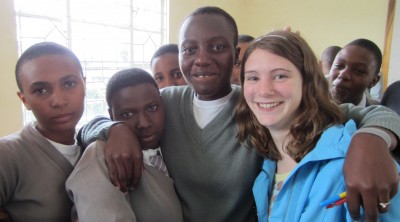
This is the story of how Neag junior Briana Hennessy missed a trip to Mexico, instead became immersed in math justification research, and went to Tanzania this summer and got to teach math.
She says of the change in destination, “I was going to do a community service project but not related to teaching, so it was much better that I got to go to Tanzania and teach. It ended up being great that I didn’t go to Mexico.”
The Mexico trip was ditched because of a U.S. State Department travel warning. So, with her summer up in the air, Hennessy emailed Neag assistant professor in math education Dr. Megan Staples, “Will you please give me something to do.” Staples put her to work transcribing videotapes of teachers showing students how to justify and prove their algebraic conclusions, “but pretty quickly I was working on coding and other parts of the project,” Hennessy recounts.
That work led to more research on the JAGUAR project – Justification and Argumentation, a Growing Understanding of Algebraic Reasoning – with Jill Newton, an assistant professor in mathematics education at Purdue. Hennessy skypes with Newton and another undergraduate student at Purdue and painstakingly codes and analyzes how a dozen teachers in Connecticut and Oregon are doing with their outlined tasks to train middle school students how to justify an algebraic property.
In their three-way debates about how to code and analyze what they see on the tapes, Newton says of the undergrads, “Both of them will stand their ground. Never ever do they say, ‘You are the professor, you are the winner.’” She credits them with being superior with technology and researching their arguments beforehand.
Newton calls Hennessy a thinker, an intellectual and, at age 21, “an old soul.” She got to know her better on the Purdue trip to Tanzania in May.
She describes Hennessy’s reaction to witnessing a Rwandan genocide trial proceeding held in Tanzania. “She wants to dig in deeper and understand the complexity of the situation. To her it’s not that simple. Not black and white. People think, well, one tribe killed people in another tribe. But she wanted to look at the historical context. She’s very curious about why things are the way they are.
For her part, Hennessy says about understanding Africa, “It’s very easy to hear stories about Africa and to get a vision of Africa. Going there gave me a complete picture. And even in this short interview I’m not able to give you a complete picture. The best way to learn about Africa is to go there.”
In her teaching experience there, Hennessy says she had a blackboard, chalk and a book, but the students didn’t. They also came into secondary school, which is by law taught in English, after speaking Swahili in primary school. How did she adjust? She wrote everything she said on the board, so students had two versions of the instruction. And she broke them into small groups, making sure each cluster had a better English speaker to relay the questions.
“It wasn’t optimum because I would like every student to be able to ask me questions, but given the time crunch and what I had to work with, it was probably the best thing I could do.”
Newton says Hennessy eagerly completed all the coursework for a math methods class in Africa for which she would receive no college credit. “She’s always going to go above and beyond,” Newton says. “And she’s lovely. She’s always kind.
“On studies abroad there’s always a lot of drama. It’s almost a compliment that I can’t tell you anything about Briana. She’s just drama-free.”
This summer Hennessy is continuing the research work with Staples with support from the Summer Undergraduate Research Fund. Staples says of her research staffer, “She is genuinely excited about new experiences and is willing to take risks and explore. She really takes advantage of opportunities that come her way, and she creates new opportunities. It’s been such a pleasure to work with her.”
Under the Integrated Bachelor’s/Master’s Degree Program at Neag, Hennessy, who has wanted to be a math teacher since age 14, is working on getting a B.S. in education and B.A. in mathematics in 2012 and her master’s in education in 2013. She works as a math tutor at the UConn Q Center and is the student representative on the General Education Oversight Committee.
In her life outside Neag, Hennessy step dances with the UConn Irish, has been known to ride her mother’s motorcycle and is described by colleagues as a donut gourmand. (Her favorite is chocolate-covered with sprinkles, but she says you have to go to a shop in Old Lyme to get the best donuts.)
Hennessy has that quality the best teachers have: a straightforward delivery. She speaks simply, explains the distributive property in one line. Her blog is simply called math teacher in Tanzania. It’s more than a nice quality; it’s a real talent.
“She seems able to sort out the unimportant and bring clarity to that which really matters,” Newton says. “I’m not good at that. She’s much more calm than me. She talks less, and when she talks, people listen and it’s worth listening to.”
 Facebook
Facebook
 Twitter
Twitter
 LinkedIn
LinkedIn
